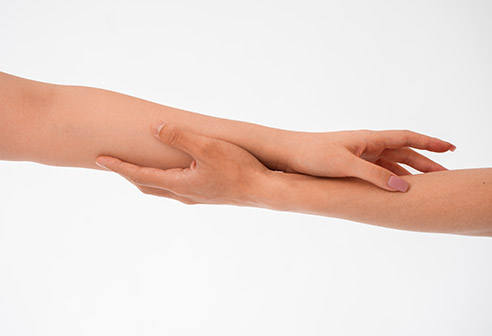
Skin is a multi-layered structure that covers and protects the body's outer surface. As the largest organ of the body, skin plays a crucial role in human health. Consisting of three main layers—epidermis, dermis, and hypodermis—the skin has many functions. These include protection against infections, prevention of water loss and temperature control, aesthetic beauty, and sensory organ function. Skin also protects humans against sun rays thanks to melanin pigment.
Why Does Skin Deteriorate?
Skin can deteriorate for different reasons. These include **stress**, **poor nutrition**, **insufficient sleep**, **smoking**, **excessive sun exposure**, **polluted air**, and **incorrect skincare methods**. Skin deterioration can manifest in various ways such as acne, redness, dryness, itching, irritation, spots, and signs of aging. You can achieve the dream of healthy skin with a conscious and balanced lifestyle.
Skin Deterioration Can Be Divided Into Two Groups
Skin deteriorations can generally be divided into two groups: **external** and **internal factors**. External factors are those that affect the skin from the outside. These can be listed as follows:
Benefits and Harms of the Sun to the Skin
There is a significant balance between the benefits and harms of sun rays to the skin. Getting the right amount of sunlight is beneficial for skin health. Sun rays aid in **Vitamin D synthesis**. Vitamin D, vital for overall health, strengthens bones by regulating the absorption of calcium and phosphorus in the body. Besides providing protection against infections, Vitamin D also plays a role in reducing the risk of many chronic diseases such as diabetes, heart disease, and cancer. On the other hand, sun rays can also be used in the treatment of some skin problems. However, **excessive sun exposure is risky for the skin**. Sun rays, divided into UVA and UVB, can lead to problems such as skin cancer, wrinkles, freckles, spots, and loss of elasticity. Sunburn increases the risk of skin cancer and can cause the skin to age rapidly.
What Are the Harms of Sun Rays to the Skin?
The main ways sun rays cause skin deterioration can be explained as follows:
Increases Wrinkle Risk
UV rays in sunlight lead to the deterioration of **collagen** and **elastin fibers** in the skin. This reduces the skin's firmness and elasticity. Prolonged exposure to sunlight, especially during midday, increases the risk of wrinkles.
Causes Dark Spots
Sun rays are one of the most important causes of **skin spots**. UV rays increase melanin production in the skin, which forms dark spots. Undesirable appearances such as darkening or pigmentation can also occur on the skin with sun exposure. Prolonged sun exposure can cause these pigments to intensify further and lead to permanent spots on the skin. Additionally, certain negative effects on skin health can be seen due to hormonal changes, medication use, or genetic factors.
Beware of Skin Cancer!
Sun rays are one of the most important causes of **skin cancer**. UV rays can damage DNA in skin, leading to the formation of cancer cells. Particular attention should be paid to the risk of skin cancer in fair-skinned individuals. In skin cancer (as with other types), early diagnosis saves lives.
Smoking Affects Skin Health
**Smoking**, which causes health problems in many systems and organs such as the respiratory, circulatory, and digestive systems, is also harmful to the skin. Toxins in cigarette smoke can lead to problems such as dull and pale skin, premature aging, wrinkles, spots, blackheads, and dryness. Nicotine can narrow capillaries in the skin and reduce blood flow, slowing down the healing process of wounds and cuts on the skin. Due to the harmful substances in cigarettes, the skin color turns yellowish or gray.
Can Cosmetic Products Damage the Skin?
Care should be taken when choosing cosmetic products used on the skin, which is one of the body's most sensitive organs. Appropriate products should be identified for healthy skincare. Products containing harmful chemicals and unregulated varieties should be avoided. For this, before purchasing a product, its quality, ingredients, and expiration date should be checked. Skin should be regularly cared for with products such as moisturizer, sunscreen, and cleanser. Additionally, it should not be forgotten that healthy nutrition and regular sleep are indispensable requirements for skin health.
What Should Be Done to Protect the Skin?
Use Sunscreen Creams
UVA and UVB rays emitted from the sun damage the collagen and elastin fibers of the skin. Long-term sun exposure can lead to wrinkles, spotting, aging, and even cancer. Protective creams should be used to shield the skin from harmful sun rays. Regular use of sunscreen creams is essential for skin health.
Quit Smoking Immediately
Smoking, a harmful habit, poses great risks to skin health. Besides serious diseases such as lung cancer, heart disease, chronic bronchitis, and emphysema, smoking also impairs skin health by reducing the absorption of oxygen and nutrients that nourish the skin. This causes the skin to look dull, dry, and aged. Smoking, which reduces the skin's collagen and elastin production causing acne, wrinkles, spots, and sagging, also brings with it the danger of skin cancer. By quitting smoking, you can make your skin look healthier, more vibrant, and younger.
Balanced Nutrition is Important
A proper and balanced diet is valuable for healthy skin, which is a mirror of your body. For this, foods containing vitamins and minerals that nourish the skin should be consumed. Consuming green leafy vegetables, red fruits, low-fat animal foods, nuts, eggs, fish, and fibrous foods helps the skin look healthier and brighter. As much as possible, avoid highly salty, sugary foods, and carbonated drinks.
Drink Plenty of Water
Water, an indispensable part of life, is life itself. Plenty of water should be consumed for healthy skin. Drinking enough water helps keep the skin hydrated and supports the elimination of toxins from the body. Water, which improves overall health, also makes the skin look brighter and more vibrant. The daily amount of water consumption can vary depending on the individual's age, weight, and activity level. Drinking 2 liters a day is beneficial.
Exercise Regularly
The positive effects of regular exercise on skin health are undeniable. Exercise, which has many benefits for physical and mental health, speeds up blood circulation in the body and facilitates better distribution of nutrients to skin cells. Exercising at specific times of the day reduces stress. This makes a person more vibrant, happy, and peaceful. Exercise opens the skin's pores. The skin should also be moisturized after exercise.
NOTE: Our content regarding diseases and treatment methods is for informational purposes only. For all matters related to your health, please consult your doctor or a healthcare institution.



